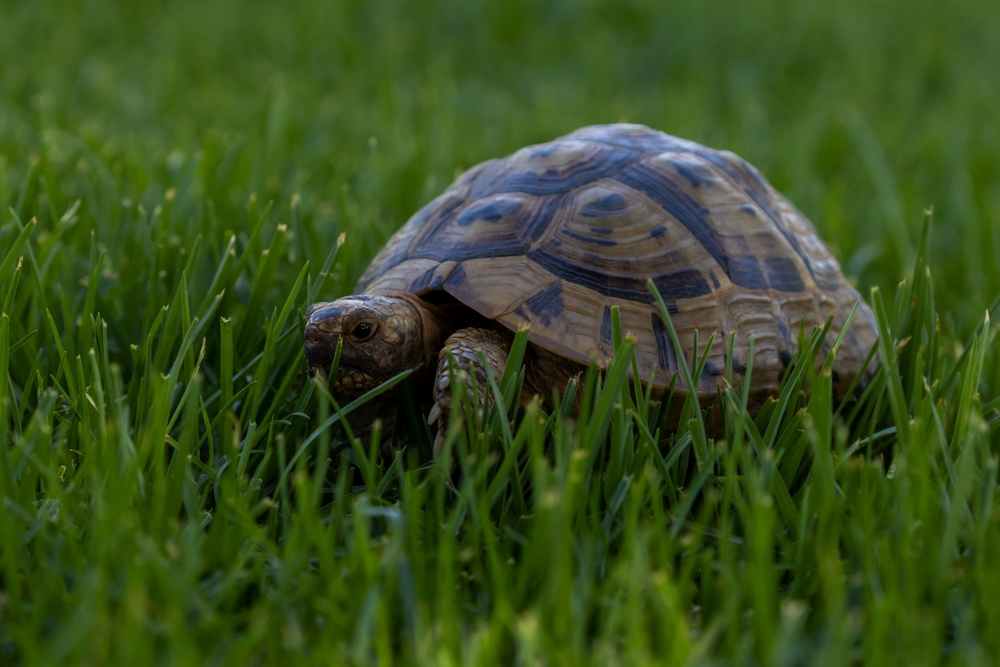When deciding to welcome a tortoise into your home, two popular species often come to mind: the Russian tortoise and the Greek tortoise. Both species are known for their manageable size and charming personalities, but each has unique characteristics and care requirements. Understanding these differences is crucial for making an informed decision. This comparative guide to Russian and Greek tortoises for prospective pet owners will help you determine which species is the best fit for your lifestyle.
Russian Tortoises
Size and Lifespan
Russian tortoises (Testudo horsfieldii) are small, typically reaching 8-10 inches in length. They have a relatively long lifespan, often living 40 years or more with proper care.
Habitat and Enclosure
Russian tortoises thrive in both indoor and outdoor enclosures. They prefer a dry, well-ventilated environment with plenty of space to roam and dig. A tortoise table or a secure outdoor pen with a variety of substrates, such as soil and sand, is ideal.
Diet
These tortoises are herbivores, primarily feeding on leafy greens, vegetables, and occasional fruits. They require a diet rich in fiber and low in protein to maintain their health.
Temperament
Russian tortoises are known for their active and curious nature. They enjoy exploring their environment and can be quite interactive with their owners, making them a delightful pet.
Greek Tortoises
Size and Lifespan
Greek tortoises (Testudo graeca) are slightly larger than Russian tortoises, typically reaching 10-12 inches in length. They also have a long lifespan, often exceeding 50 years with proper care.
Habitat and Enclosure
Greek tortoises require a warm, dry environment with access to UVB lighting. They thrive in outdoor enclosures but can also be kept indoors if provided with adequate space and heating. They enjoy basking spots and hiding places to feel secure.
Diet
Similar to Russian tortoises, Greek tortoises are herbivores. Their diet should consist of a variety of leafy greens, vegetables, and occasional fruits. Calcium supplements are essential to prevent shell deformities and other health issues.
Temperament
Greek tortoises are generally more docile and shy compared to Russian tortoises. They enjoy basking and foraging but may take some time to warm up to their owners.
Key Differences
- Size: Greek tortoises are slightly larger than Russian tortoises.
- Habitat Preferences: While both species can be kept indoors or outdoors, Greek tortoises have a greater need for basking spots and hiding places.
- Temperament: Russian tortoises are more active and interactive, whereas Greek tortoises tend to be more reserved.
Care Requirements
Both species require a commitment to their care, including regular feeding, habitat maintenance, and health monitoring. It’s essential to provide:
- Proper Diet: Both species need a diet rich in leafy greens and vegetables, with occasional fruits.
- Adequate Enclosure: Ensure enough space for movement, basking, and hiding.
- Regular Veterinary Care: Routine check-ups with a reptile veterinarian are crucial to detect and prevent health issues.
Which Is Right for You?
When choosing between a Russian and Greek tortoise, consider your living environment, the amount of interaction you desire with your pet, and your ability to meet their specific care requirements. If you have limited space and prefer a more active and interactive pet, a Russian tortoise might be the better choice. However, if you can provide a larger enclosure and prefer a more docile and reserved pet, a Greek tortoise could be the ideal fit.
Conclusion
Deciding between a Russian and Greek tortoise involves understanding their unique characteristics and care needs. Both species make excellent pets, offering years of companionship and enjoyment. By considering their size, habitat preferences, diet, and temperament, you can choose the tortoise that best suits your lifestyle.




More Stories
Choosing the Best Tools for Flawless Nail Art
Get Real Results: Buy Instagram Likes and Followers from InsFollowPro.com
Long-Lasting Elegance: Tips to Extend the Life of Your Acrylic Nails